Xbox One Mini Series controller review – Big performance from a small pad
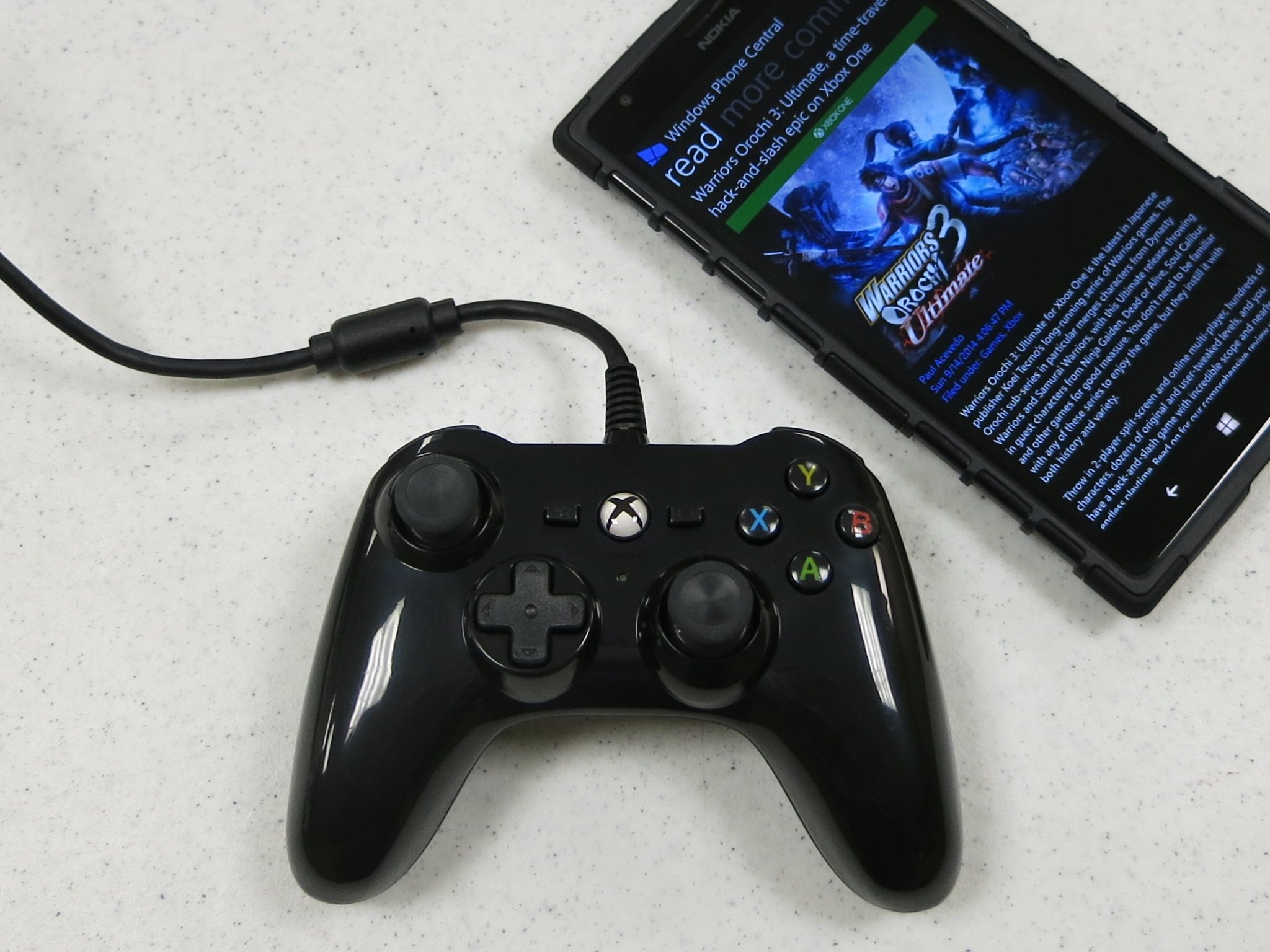
Last week we promised to bring you more Xbox One accessory reviews, and we weren't kidding! I have no less than six controllers and other accessories in the hopper, just waiting to be put through their paces so that our readers can know what's up. First up will be the new Xbox One Mini Series Wired Controller from Power A (makers of the MOGA controllers.
The Mini Series Wired Controller is exciting for a number of reasons. Along with PowerA's Spectra Controller, it's one of the very first two wired controllers for Xbox One. Many gamers prefer wireless for comfort, but wired controllers can still be very handy. The Mini Series controller is also smaller than a standard Xbox One controller, making it more suitable for players with small hands. And last but not least, it sells for $39.99 – $20 less than the standard controller.
Read on to find out whether the Mini Series Controller is right for you.
Two colors, all gloss
This controller comes in two color variations: black or green. Only the plastic shells and USB cables differ in color. The buttons, etc. are identical in both controllers. You won't find an exposed black area on the green color or vice versa, unlike colored first-party controllers. For the purpose of this review, we picked up a black controller.
Whichever color you pick, the Mini Series controller comes in a glossy finish. That's not too uncommon for controllers, but it's a worse choice than a matte finish. Glossy controls show smudges basically any time you handle them. Even just shooting the photographs and video for this review, the controller got fairly smudged up. A matte finish would look cleaner after handling, and (in my opinion) a bit less cheap as well.
Plug it in
The first difference between the Mini Series and a regular Xbox One controller is the Mini Series' built in USB cable. As far as we know, Microsoft still requires third-party controllers to be wired, so it's not like PowerA had a choice in the matter. But the wire can be handy in many situations. You'll never need to worry about the controller powering off when left idle, or having to fish around for a cord when you need to plug it in.
The Mini Series cord itself is 3 meters (9.8 feet) in length. That's a generous length. You needn't fear anyone damaging the controller or console by tripping over the cord, either. The male end of the cable has a breakaway connector, just like wired Xbox 360 controllers. Glad to see that innovation carry over to wired Xbox One controllers!
Get the Windows Central Newsletter
All the latest news, reviews, and guides for Windows and Xbox diehards.
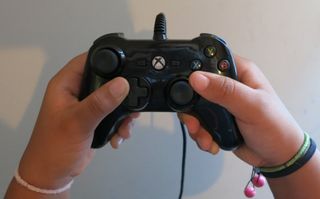
Size matters
The Mini Series Controller's standout feature is (of course) its diminutive size. I don't know the exact ratio, but this controller seems about twenty percent smaller than the standard Xbox One controller (and about a centimeter shorter than a Playstation controller). That doesn't make it exceptionally small per se, just a bit more appropriate for children and people with smaller hands.
"They look like big, strong hands, don't they?" No, the controller isn't too small for adult male hands to use. I find it perfectly comfortable to use. Someone with extra-large hands like Mobile Nations' very tall Simon Sage might find it too small, though.
Parts and performance
Let's run down the controller's various sticks and buttons and see how they measure up to a first-party controller's.
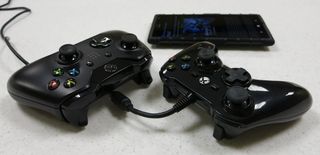
Analog sticks
The single easiest thing for third party controllers to get wrong is the analog sticks. Even my favorite third-party Xbox 360 controller, the Hori EX pad 2, has shabby sticks. That's why I'm so happy to say the Mini Series has great analog sticks!
They have the perfect length and resistance. Their length is about 2mm shorter than the official sticks, which are slightly too long in my opinion. The tops are about a millimeter smaller in radius compared to the first-party sticks, and aren't nearly as prone to collecting debris, either.
D-pad:
On the Xbox 360, third-party controllers usually boasted superior D-Pads to the official controllers (whose d-pads were awful, even the slightly better transforming variety). The official Xbox One D-Pad is much better though.
The Mini Series D-Pad basically rates about the same. It's a millimeter or so smaller in diameter and has grooved arrows on each direction, but otherwise closely resembles the official D-Pad in shape and performance.
Face buttons
The X, Y, A, and B buttons are smaller and spaced farther apart from each other on the Mini Series controller. They're still larger than you'd find on a Nintendo portable though.
Home button and LED
Instead of resting almost at the top of the controller, the Mini Series' Home button sits closer to the center. It does not light up or have a chrome finish. It sticks farther out from the controller body and feels different to press. Other than not looking quite as nice as a light-up button, I don't see that as a problem.
The Mini Series does have a white LED, but not inside of the Home button. Instead, you'll find it a centimeter below Home. Again, not as aesthetically pleasing as the alternative, but at least we do get a light to indicate that the controller is drawing power.
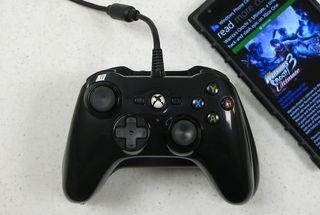
View and Menu
The Back and Start button equivalents have a more elongated shape than on the official controller, and they sit on either side of the Home button. Menu (Start) is slightly too close to the X button, but it should only cause issues if you rest your thumb too far to the left or start mashing the buttons.
Bumper buttons
Another pleasant surprise: the Mini Series Left and Right Bumpers are better than the official controller's! Basically, they stick out from the controller more. They have a stronger click and feel more responsive in general. Many games don't require precision bumper presses, but a game like Killer Instinct will benefit from the Mini Series' responsive bumper design.
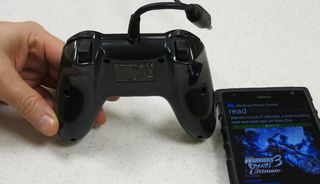
Triggers and vibration
You win some, you lose some. The Mini Series' triggers and vibration simply don't measure up to the official pad's. Not a big surprise as those are two of the official Xbox One controller's strongest points.
The triggers are much smaller and less concave in design. They have less room to travel, making it harder to press them with less than full strength.
As for the vibration motors, they present less low range vibrations than the official controller's. You'll still feel the rumble when you take a hit or whatever, but the milder vibrations are harder to notice.
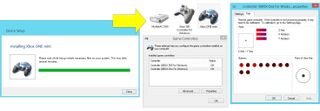
Windows support
The Mini Series Controller is fully PC compatible. Oddly, my Windows 8.1 system registers it as both an Xbox 360 and Xbox One controller. But the controller only functions with the Xbox One driver, which is good enough.
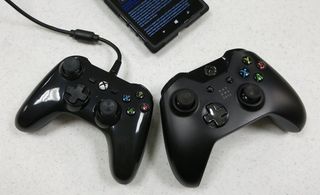
Only one thing missing
The Mini Series' most obvious flaw is its lack of headset port. You simply can't use a headset while playing with this controller. That greatly restricts the Mini Series Controller's usefulness when playing online games (with the exception of Warframe, which supports keyboard chat).
Still, the controller's small size and low price make it perfect for use as a child's controller or an additional controller for local multiplayer games. Many players won't want to spend $60 for a set of four controllers, but you can easily save twenty bucks by making this one of your extra pads.
PowerA's Mini Series Controller is way better than you'd expect from an affordable third-party pad. The one big flaw, the lack of headset support, is something you're told about up front. Nearly everything else, from the sticks to the d-pad to the buttons, performs just as well as any Microsoft controller.
This controller is not available at Amazon in the US just yet, but you can find it at several other retailers. You can also preorder it at Amazon UK. We'll update with a US Amazon Link when that becomes available.
Paul Acevedo is the Games Editor at Windows Central. A lifelong gamer, he has written about videogames for over 15 years and reviewed over 350 games for our site. Follow him on Twitter @PaulRAcevedo. Don’t hate. Appreciate!
